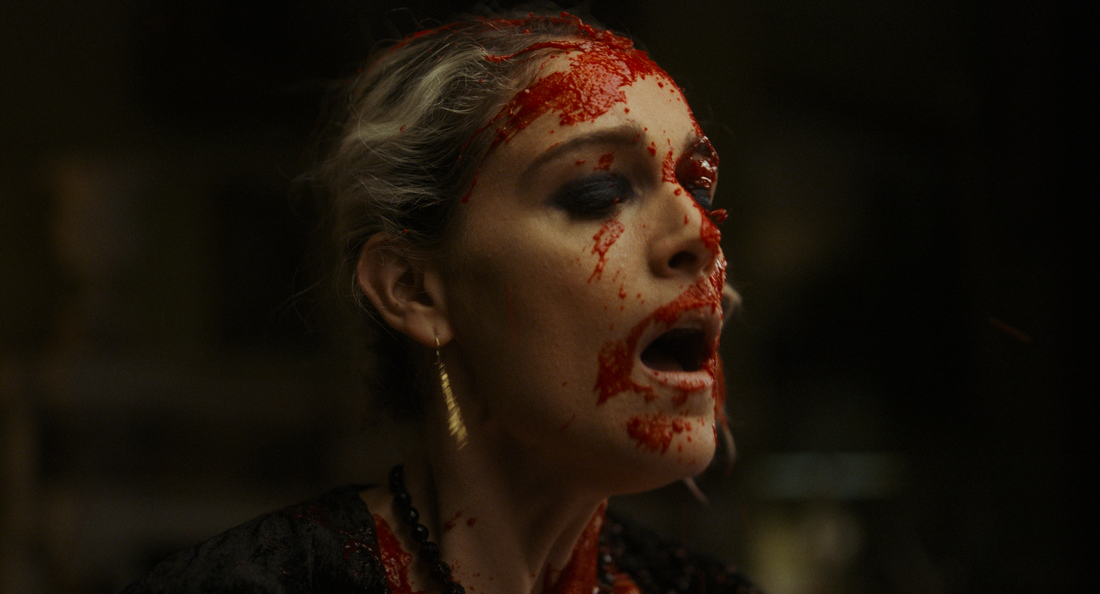|
Interview by Sean Boelman
In the genre community, Peter Strickland is one of the most beloved filmmakers because of his films' unique use of atmosphere and satire. His newest work, the high society satire Flux Gourmet, is perhaps his most idiosyncratic film yet — a truly bizarre blend of gastric distress, dark humor, and commentary on the art world — but it’s downright fascinating to dissect.
We at disappointment media had the chance to speak with Strickland about his film and some of the techniques he used in creating this surreal fantasy. Check out the interview below and be sure to see Flux Gourmet, in theaters and on VOD now! On His Distinctive Use of Sound
disappointment media: Sound is an important part of all of your films, and I would say it's especially important in Flux Gourmet. What do you like most about sonic experimentation in your films?
Peter Strickland: Well, I suppose a little bit just came from watching Eraserhead at quite a young age. I was 16. And that was a huge epiphany for me, because I think prior to that, I was watching, you know, Tom Cruise films, which I still love, but it's just a very different approach to sound in something like Cocktail. And suddenly, sound was not illustrating something, it was actually expressing something. And there was just a complete reversal of how I thought about sound, how it conveyed a state of mind and it really just opened up something that I really wanted to explore, that I felt I could do something with somehow. So yeah, I think I'm still chasing that feeling from watching Eraserhead all those years ago. disappointment: In this film, particularly, I really loved your use of experimental music. What were some of your influences for the soundtrack of the film in that regard? Strickland: Well, it's gonna sound very self reflexive, but we had a band called The Sonic Catering Band. So a lot of it came from what we did. But also, I was listening to Luigi Nono. And we actually played his music for the trips to the shops, especially. I think when the guy who did the eventual music, Roger Stevens, he was using all these gongs and he fed into this 2600 modular synthesizer, the same synthesizer that I think that Ben Burtt used for R2D2. And I think a lot of it also came from bands like White House, Throbbing Gristle, Robert Ashley, even Butthole Surfers. A lot of people were taking found voices coming back from radio phone-ins or whatever, but usually detailing something very disturbing, you know, horrific abuse and so on. So really quite shocking stuff. But there's something very haunting about the quality of the voice, this found voice, and I wanted to try that with the scene in the film, the scatological scene, but I didn't want to have anything where someone is a victim. I wanted to do something else. But it was still very intense. So I wrote something for that and the mixer's friend. He got an actor he knew to record something in German, and we treated it as if it came from some kind of radio phone-in. And so yeah, I think bands like that. On Flux Gourmet's Unorthodox Satire
disappointment: So in the film, you juxtapose this high society institution, with shock value with an almost ribald nature. What made you want to set out on this satirical approach?
Strickland: I guess it's a world I know quite well, both the funding world and being in a band, something I felt quite confident in. Obviously, what you're seeing is not the real world. But I was interested in the whole power play in these arguments and how ego, just like in everything in life, especially politics, how ego just destroys everything. It's very important to take the most ridiculous thing, you know, a tiny change in the flanger. That's all they wanted, it wouldn't make any difference either way. But they lock horns over something so small. So in a way, the flanger was a MacGuffin to explore. Yeah, I guess I was interested in ego, in deceit and how and how people self curate themselves, especially now in the world of social media, how you present yourself, the nature of doing a biopic about yourself, and I wanted to look at the lies, the deceit behind all that. disappointment: And in a similar way, the film has this, you know, very absurd sense of humor on one hand. And then on the other hand, it's very solemn. Why do you think that this balance between the two modes was important to you? Strickland: Well, I wanted to look at stomach issues. We've seen them played for laughs all the time. Fair enough, fine. But I wanted to look at it differently. I think for a lot of people, it's not a joke. It's something very, very, very, very serious. I'm not aware of that having been done before. So as you say, to take something which is normally done as something vulgar or something "frat boy" or funny and give it this laconic, solemn feel. And obviously, it's pitted against all the bickering you see, between the band. How that gels together? I don't know. I'm hoping it works for one audience. But you know, what I'm more concerned about is an audience being with Stones's character, whether they laugh or not at all. The bickering doesn't bother me. But, you know, if they laugh at the Stones character, I feel I've somehow failed. ut someone told me after seeing the film, they said, "Oh, you know, your fart jokes were not very funny." And it's like, "Okay, that was the idea." disappointment: I think that one of my favorite parts of the film is the character work. So you have like, Stones in the film is spatially with the characters, you know, a few steps aside, but also kind of intimately voyeuristic. And I feel like that is also what we feel as the audience. How did you kind of go about building this? Strickland: Very much. He is a narrator, he is a window into their world. But obviously, we're a window into his world. I think what fascinated me was when I make films, sometimes you have, they call them the EPK person, the electronic press kit person, someone who's there to document us filming. And their job is to be invisible. And those characters always fascinate me. Let's take the invisible person, let's put that person on center stage. And he clearly wants to be invisible. That's the whole thing. One, that is his job to be invisible, and two, because of his stomach issues, he's even more motivated that way. And somehow, it's like a centrifuge is just going to suck it into the center by the manipulations of Fatima's character. So that was the thing, he's invisible, but he's unwitting. He ended up in the band, basically, so it's just charting that journey of being someone who is just doing a job, but there's this idea that he is someone who, like a lot of these characters, they're all aspiring directors, or aspiring novelists, and all of us have to do jobs, which are commercial jobs. And I do commercial jobs. I write for other people. So I'm very much used to the idea of putting on a different head. You know, he's there like a tailor. So yeah, I'm just interested in those characters really.
Flux Gourmet is now in theaters and on VOD.
0 Comments
Leave a Reply. |
Archives
March 2024
Authors
All
|
|
|
disappointment media
Dedicated to unique and diverse perspectives on cinema! |


